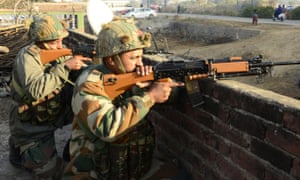Assaults on consulate in Afghanistan and airbase in India near Pakistan border threaten to scupper two separate but linked diplomatic efforts in region

Two key peace initiatives in south Asia are in jeopardy after terror attacks on Indian targets that many suspect are linked to groups based in Pakistan.
Security forces on Monday continued their efforts to end gun attacks on the Indian consulate in the northern Afghan city of Mazar-i-Sharif and at the Pathankot airbase in Indian Punjab, close to the Pakistani border.
The attack on the Indian consulate began on Sunday night when gunmen tried and failed to break into the building. After suspending their operation for much of the night, Afghan special forces resumed a gunfight against militants holed up in a building opposite the consulate. The Indian government said all its staff were safe.
At the same time, Indian security forces were still engaged in mopping up operations in Pathankot, which began when at least four suicide fighters attacked the base on Saturday, killing seven soldiers.
Suspicion immediately fell on groups based in Pakistan, with some critics suspecting involvement of elements within the country’s security establishment, which has long been deeply antagonistic to India.
The Pathankot attack was widely blamed by Indian media on a Pakistani militant group called Jaish-e-Mohammad, which focuses its efforts on Indian-held Kashmir, a Muslim-majority region claimed by Pakistan.
Pakistan’s foreign ministry issued a statement condemning the incident and said the country wished to “completely eradicate the menace of terrorism from afflicting the region”.
There were no immediate claims of responsibility for the Mazar-i-Sharif attack but the presence of Indian diplomats outside Kabul is a source of intense discomfort for Islamabad, which has alleged in the past that consulates are used by Indian spies to foment unrest in Pakistan.
There have been several attacks on Indian interests in Afghanistan over the years, including a 2008 bombing of the embassy in Kabul which US officials later blamed on Pakistan’s Inter-Services Intelligence directorate (ISI).
The attacks were potential blows to two separate but linked diplomatic efforts to lower tensions in the region: an attempt to thaw relations between Pakistan and India, and a renewed attempt by Pakistan to broker peace talks between theTaliban and the Afghan government. Both initiatives are still at their early stages.
Hopes for rapprochement between Pakistan and India, which have fought four wars since independence in 1947, rose dramatically on 25 December when the Indian prime minister, Narendra Modi, made a surprise visit to the Pakistani city of Lahore to meet his opposite number, Nawaz Sharif.
Previous periods of bonhomie between the two countries have been sabotaged by terror attacks and many analysts suspected Pathankot was part of a similar, deliberate effort to damage relations.
On Monday an Indian official told Reuters the government was considering whether to go ahead with talks with Pakistan scheduled for later this month.
Separately, Pakistan and Afghanistan, together with representatives from China and the US, are scheduled to meet in Islamabad on 11 January to prepare for potential talks with “reconcilable” members of the Afghan Taliban.
Diplomats say Pakistan had promised it would use its influence with the Taliban, which are largely based in Pakistani territory, not only to bring amenable militants to the negotiating table but also to reduce soaring levels of violence.
However, insurgent assaults have continued unabated, with recent weeks seeing several attacks in Kabul on the Spanish embassy, a French restaurant popular with foreigners and the international airport.
The airport was targeted once again on Monday when a suicide bomber detonated his device on a nearby street. There were no reported casualties.
[Source:-the gurdian]
